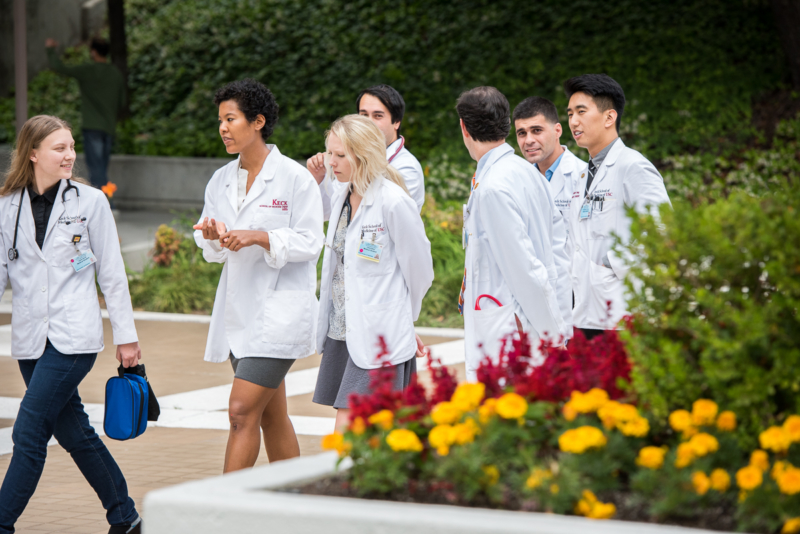By Landon Hall
You’d think something called “Intro to Clinical Medicine” would have been the cornerstone of any medical education program right from the start. As in, since Day 1 in 1885, when USC’s medical school opened its doors.
But not so. As Greg Harlan, MD, MPH, associate professor of clinical pediatrics, puts it:
“Medical school curricula were so focused on learning the anatomy and pathology and physiology, and there was an enormous amount of material to cover. I believe the thought was to build a great scientific foundation of knowledge in Years I and II, and then you were immersed in the bustling LA County Hospital for Years III and IV so you gained all your clinical skills there. But the realization was that injecting some clinical encounters early on would inspire the students, add “zest to the curriculum” and remind them why they were going through this rigorous training.
So the school, later to become the Keck School of Medicine of USC, implemented the Introduction to Clinical Medicine (ICM) program, in 1970. At the time it was one of the first programs of its kind at U.S. medical schools.
“I think the original directors knew that this course would help keep the flame of the healing relationship alive during Years I and II,” says Harlan, the Director of KSOM’s ICM program. While it has evolved over the years, the program continues to be the hallmark of the medical school curriculum. Students begin developing their clinical skills through simulated training in our state-of-the-art clinical skills center and by supervised interactions with real patients from the very first few weeks of med school.
Fifty years goes by fast, and to mark a half-century of this vital education for future physicians, ICM threw itself a celebration on Oct. 29. Watch the replay of the virtual event. Harlan hosted the proceedings and moderated a panel discussion titled “History to the Horizon.”

Dr. Harlan observes as Sarah Rotondo (left) examines Michelle Hough. Both are Class of ’21 med students.
It featured a “look back on the past 25 years of the ICM program,” Harlan said, “from the perspectives of three ICM directors (Drs. Maureen Strohm, Pamela Schaff, and Terri Woerhle). They are wonderful leaders who helped shape ICM program and make major strides in diversifying the program. This will be a chance to reminisce, reflect, and describe the magic that is ICM.”
There was also the presentation of the Marvin E. Don Award, named for the longtime faculty member. This year’s recipient is Dr. Victoria Szatalowicz. “Dr. V” is a nephrologist “and has such a passion for her students and their training that she goes above and beyond,” Harlan says. “She has been teaching ICM for 23 years and attends all of our faculty meetings and extra working sessions. Her students adore her. One commented that ‘she embodies every value I cherish in a doctor: integrity, honesty, focus, transparency, altruism, kindness and grace.’ “
Harlan said med education in the time of COVID has been unprecedented and challenging. “We have all been working tirelessly to balance the educational mission with the public health needs and the anxiety and fear that comes with COVID,” he says. “Yet we have finally hit our stride and figured out a way to navigate through face masks, face shields, symptom checks, Zoom teaching, and luckily much hands-on patient care at the bedside.
“Our Keck faculty, staff, and students are simply amazing … we will find our way through this.”
